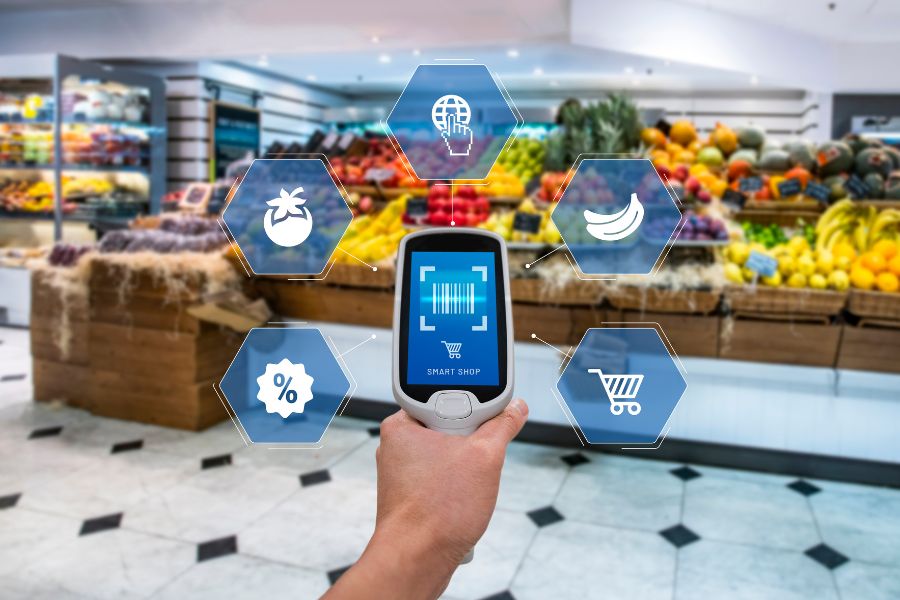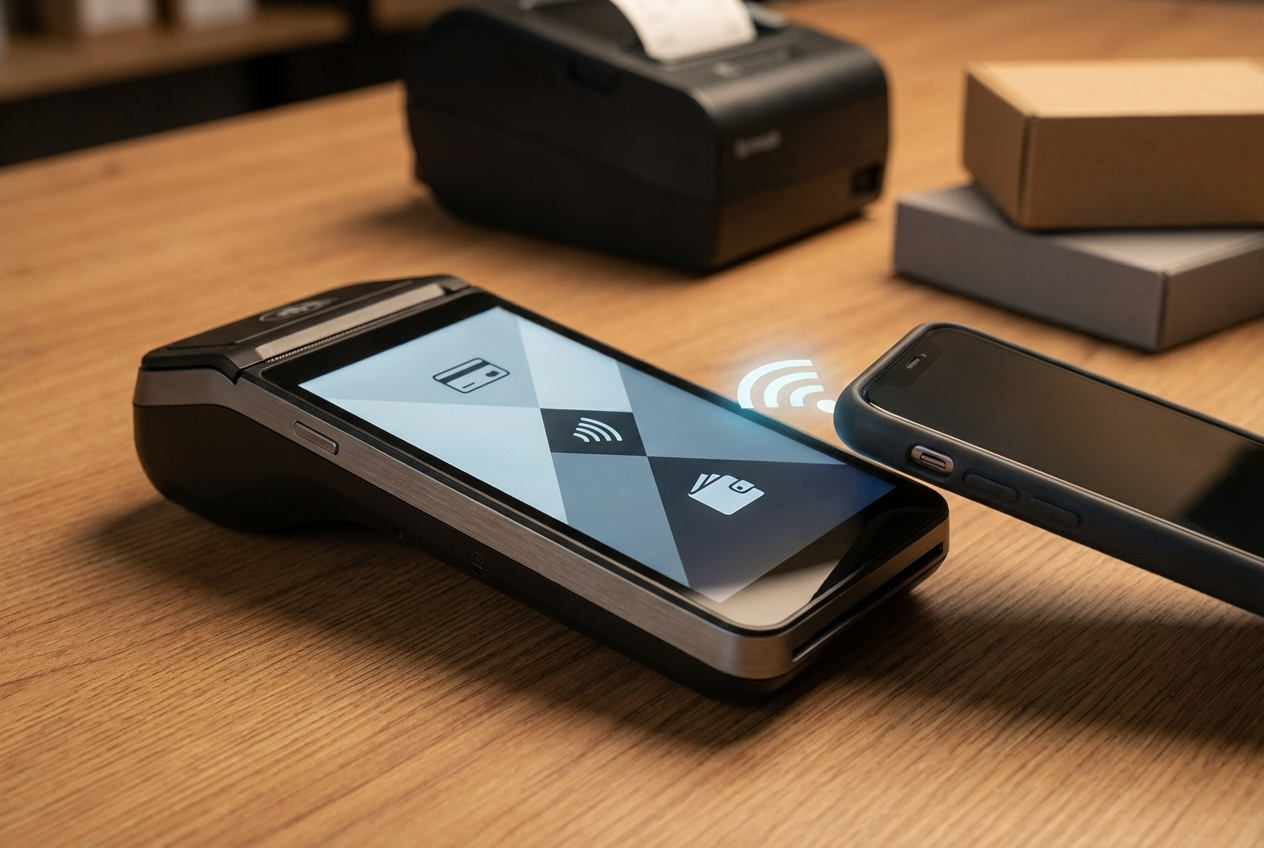Artificial Intelligence (AI) is changing every industry, and retail is no exception. It’s no exaggeration to say that robots and AI-driven technologies are starting to make their mark in your local shopping centers, as you’ll see in the artificial intelligence in retail examples highlighted below. But before we get into those, consider the stats from PwC. By 2022, 71% of businesses had already jumped on the AI area, whether in full force or on a small scale. Of course, that number’s only going up.
Highlights:
- AI can help retailers with tasks like personalized customer experiences, inventory management, dynamic pricing, and customer service automation.
- Using AI in retail leads to improved efficiency, higher customer satisfaction, and increased sales through data-driven decisions.
What AI Technologies and Solutions Are Used in Retail?
Artificial intelligence (AI) in retail encompasses several core technologies, such as machine learning, predictive analytics, and data processing tools, which work together to analyze large datasets. These technologies empower retailers to make smarter decisions by predicting trends, forecasting sales, and streamlining operations.
One of the critical ways AI is utilized in retail is through customer intelligence and behavioral analytics. Retailers can personalize marketing efforts and improve customer service by using AI-powered analytics on customer interactions and preferences, thus creating more meaningful engagements.
AI-powered tools also sift through data collected from the Internet of Things (IoT) devices and other sources. So, not just customer experience, retailers can further optimize everything from supply chain management to inventory control.
Predictive analytics in AI enables retailers to anticipate market shifts and consumer demand with greater accuracy. For instance, from past purchase data, AI systems can forecast future trends, helping retailers stock products more effectively and reduce waste. Moreover, autonomous AI systems can act without human intervention, continuously learn and adapt to provide even more precise insights.
What Does Artificial Intelligence in Retail Look Like?
Ai-Powered Inventory Management
One key area where AI is making a significant impact is inventory management. Machine learning models analyze market trends, consumer behavior, and competitor data to create more accurate demand forecasts. Hence, retailers can proactively adjust supply chains, optimize stock levels, and fine-tune pricing strategies, ensuring they have the right products available when customers need them.
Adaptive Homepages for Personalized Shopping
AI is also enhancing digital experiences with adaptive homepages. By analyzing shoppers’ previous behaviors and preferences, retailers can deliver hyper-relevant product recommendations and personalized offers. This dynamic personalization helps engage customers and drive sales since every interaction becomes more tailored and meaningful.
Interactive Chatbots and Conversational Assistants
►►► Optimal solution set for businesses: Multi store POS, Next-gen POS, Inventory Management Software (MSI), Self Service, Automation, Backorders
AI-powered chatbots and conversational assistants are revolutionizing customer engagement. Using natural language processing, these tools interact with customers in real-time, answer queries, offer recommendations, and even help them make purchase decisions. Additionally, these bots gather valuable data on customer preferences then feed back into the system to continuously improve the shopping experience.
Visual Curation and Discovery
AI enables visual curation, assisting customers to discover products through image-based searches. Advanced algorithms analyze the aesthetic qualities of an item a shopper views and recommend similar products, thereby creating a digital shopping experience that closely mirrors in-store browsing.
Emotional Response Analysis
Going one step further, some retailers now leverage AI to analyze shoppers’ emotions through biometrics and facial recognition. By gauging a person’s emotional responses in real-time, AI helps retailers provide optimized interactions. A customer can be feeling excited, confused, or frustrated, while the retailer would still be able to provide responsive service.
Operational Optimization
AI improves operational efficiency by optimizing logistics, inventory levels, and staffing through real-time data analysis. This results in streamlined supply chains and enhanced customer service, allowing retailers to meet growing demands for fast, high-quality service.
Personalization and Customer Insights
AI-driven personalization goes beyond product recommendations. Retailers now employ AI to analyze demographic data, social media behavior, and purchasing patterns to create highly customized shopping experiences. In-store displays can recognize loyal customers, and online platforms offer tailored rewards, helping deepen customer loyalty and increase revenue.
Real-Life Artificial Intelligence In Retail Examples
Let’s explore how artificial intelligence is breathing new life into retail and eCommerce through the following examples:
AI in Customer Service
AI-driven chatbots now deliver 24/7 customer support, which is essential in today’s retail landscape. According to a study by The Precedence, customer relationship management (CRM) was one of the top AI use cases in retail, representing 21.5% of the market share in 2022.
Sephora, a beauty retailer, has introduced additional chatbot features, including Reservation Assistant and Colour Match. These bots on Messenger provide customers with easier access to Sephora’s services, which enhance their engagement and make interactions more efficient.
AI-Enabled Robotics for Warehouses
As retail operations become increasingly complex, especially for eCommerce, AI-driven robotics are playing a crucial role in streamlining warehouse management. These robots handle repetitive tasks such as picking and packing with precision, reducing the need for manual labor and increasing overall efficiency.
InVia Robotics offers a unique “robotics-as-a-service” solution with AI-driven picker robots for eCommerce and supply chain automation. By working alongside human teams without interrupting workflows, these robots enhance efficiency and reduce labor costs.
Anti-Counterfeit AI System
Counterfeit goods are a growing problem in online retail, harming both retailers and consumers. AI-powered systems are now being used to combat this issue by identifying fake products more efficiently than manual processes ever could.
3PM uses advanced AI to help companies protect themselves and their customers from counterfeit goods sold online. With machine learning algorithms that constantly evolve, its system improves the ability to identify fake products, offering a smarter solution to combating counterfeiting across online marketplaces.
AI for Enhanced Customer Experience and Security
AI isn’t just about improving sales, it’s also essential for enhancing the overall shopping experience and ensuring the security of transactions. Retailers are now using AI to create smarter, faster, and safer platforms for their customers.
eBay employs AI to provide tailored shopping recommendations, optimize delivery times, and ensure accurate pricing. The platform also includes features like image-based product searches and automatic page translation. In addition, eBay’s AI fraud detection system has significantly improved security to identify 40% of credit card fraud with remarkable precision.
Machine Learning for Product Recommendations
AI’s ability to analyze customer behavior in real-time has transformed how retailers present products to their shoppers. Machine learning helps retailers understand their customers on a deeper level.
Rue Gilt Groupe offers members exclusive access to discounted luxury goods powered by AI and machine learning. The platform analyzes customer behavior and its expansive product selection to generate tailored recommendations, thereby helping shoppers discover premium items that match their preferences.
AI-Powered Cash Back Rewards
Customer loyalty is fiercely competitive in retail, and AI is an useful tool for retailers to innovate by offering personalized rewards that resonate with shoppers. Cash-back rewards are now driven by data to meet individual preferences.
Upside’s app encourages users to shop at local businesses by offering cash back rewards. AI personalizes these offers based on consumer behavior, improving the shopping experience and helping businesses increase their profits.
Strategies to Maximize Artificial Intelligence in Retail
Here are key approaches to ensure AI delivers the best results for your business:
Focus on Personalized Customer Experiences
AI thrives on data, and one of its most valuable uses in retail is personalizing the shopping experience. Retailers should leverage AI tools to collect and analyze data on customer preferences, behaviors, and demographics.
With AI, you can offer tailored product recommendations, dynamic pricing, and personalized marketing, leading to higher customer satisfaction and increased loyalty.
Implement Predictive Analytics for Inventory Management
Managing inventory becomes easier with AI-driven insights. Use predictive analytics to forecast demand based on past sales and shopping trends. This helps you avoid overstock or stockouts.
You can also plan ahead for seasonal changes or unexpected shifts in demand. With better forecasting, you optimize inventory levels and improve the efficiency of your supply chain, reducing both costs and risks.
Automate Customer Service With AI Chatbots
AI chatbots and virtual assistants provide immediate responses to customer queries and resolve common issues, removing unnecessary human effort. As a result, response time is shorten and it improved the overall customer experience.
Chatbots simultaneously collect data during interactions, which gives you valuable insights into customer needs. Over time, these insights help refine your services and provide better responses to future inquiries.
Use AI for Dynamic Pricing
AI algorithms can adjust prices in real-time based on factors like demand, competitor pricing, and consumer behavior. This keeps your pricing strategies flexible and ensures you’re capturing the right customers at the right time.
You can also offer personalized promotions based on shopping patterns, creating more targeted incentives that drive sales.
Enhance Visual Search and Product Discovery
Make shopping easier for your customers with AI-powered visual search. Instead of typing keywords, they can upload images to find what they’re looking for.
AI scans the images and recommends similar products. This feature improves the shopping journey by helping customers discover items faster and more conveniently, leading to a more engaging experience.
Leverage AI for Operational Efficiency
AI can be optimized in retail operations by improving logistics, inventory management, and staffing through real-time analytics.
Utilize it to analyze store traffic, predict peak hours, or optimize delivery routes. These insights help you schedule staff more effectively and streamline logistics. By using AI to make decisions based on real-time data, you reduce costs and run your business more efficiently, improving customer satisfaction across the board.
Monitor and Analyze Customer Sentiment
Customer feedback is a goldmine of insights, and AI can help you make sense of it. Sentiment analysis uses AI to interpret feedback from reviews, social media, and other sources.
Once understand how customers feel about your products and services, you can adjust your offerings, marketing strategies, and customer service to better align with their expectations. This helps you stay attuned to customer needs and improve your overall brand perception.
Continuous Training and Fine-Tuning of AI Systems
AI isn’t a set-it-and-forget-it tool. For AI to remain useful, it needs to be continuously trained on new data.
Regular updates ensure that your AI models stay relevant and accurate as customer preferences and market conditions shift. This ongoing process keeps your AI systems aligned with current trends, making them more effective in driving business results.
The Future Of AI In The Retail Industry
The future of AI in retail is poised to expand rapidly, as partnerships between retailers and tech firms push innovation forward. Here’s what to expect:
- Enhanced operations and customer experience: AI will continue improving both back-end operations and customer-facing interactions, from inventory management to personalized shopping experiences.
- Machine learning dominance: As the fastest-growing branch of AI, machine learning will play a crucial role in predicting consumer behavior, optimizing pricing strategies and automating decision-making processes.
- Digitized supply chains: Expect increasingly sophisticated, AI-driven supply chains that are faster, more efficient, and better at adapting to market changes.
After all, the future of AI in retail is full of possibilities, and new use cases will continue to shape the industry in surprising ways.
ConnectPOS is a powerful point-of-sale solution designed to meet the needs of modern retailers. It integrates seamlessly with popular eCommerce platforms, offering real-time synchronization of inventory, orders, and customer data across multiple sales channels. The system supports a wide range of payment methods, making transactions smooth and efficient. With its customizable interface, you can tailor the POS experience to fit your business model, whether you operate a small boutique or a multi-location chain. Moreover, ConnectPOS is currently developing AI-powered tools to further enhance retail operations, helping businesses automate processes and improve customer experiences in the near future.
FAQs: Artificial Intelligence in Retail Examples
- How does AI improve the customer experience in retail?
AI personalizes shopping by recommending products, offering tailored promotions, and adjusting prices. It also powers 24/7 chatbots and visual search tools, making shopping faster and more engaging.
2. What role does AI play in inventory management?
AI helps predict demand by analyzing past sales and trends, which reduces overstock and stockouts. This leads to better inventory control and a more efficient supply chain.
3. Is ConnectPOS developing AI-powered tools for retailers?
Yes, ConnectPOS is currently working on AI-powered tools to automate retail processes and enhance customer experiences, offering even more innovative solutions soon.
Conclusion
As you can see from the Artificial Intelligence in retail examples above, artificial intelligence has the potential to benefit nearly every retail business. What about yours? It all comes down to choosing the right AI applications that deliver the best bang for your buck.
ConnectPOS is one of the leading POS solutions for businesses and retailers today. With AI features currently in development, it’s only a matter of time before we allow businesses to unlock even more innovative ways to operate. Even now, our advanced solutions are more than capable of streamlining key operations, such as inventory management and seamless payment processing. Contact us now to find out how we can help you!
►►► Optimal solution set for businesses: Shopify POS, Magento POS, BigCommerce POS, WooCommerce POS, NetSuite POS, E-Commerce POS



